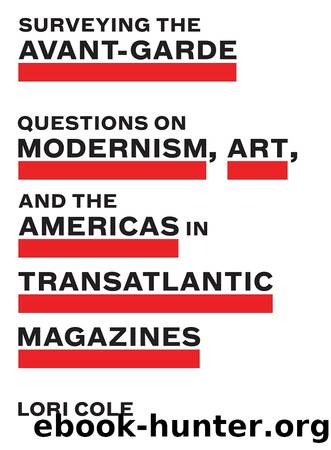Surveying the Avant-Garde by Lori Cole

Author:Lori Cole
Language: eng
Format: epub
Publisher: Pennsylvania State University Press
In 1930 the Parisian magazine Cahiers de l’Étoile printed responses to a questionnaire on “inquiétude contemporaine” (contemporary unrest) that it had issued two years prior to a wide range of international contributors.1 (fig. 18) This questionnaire notably interrogated the “contemporary” as opposed to “modernism” or the “avant-garde,” which had been more commonly used to periodize at the time and were often called into question in other inquiries. Moreover, other questionnaires from the 1920s and 1930s usually focused on national or regional canon-building projects. What distinguished this questionnaire was both its new temporal lens and its broad geographic reach. It brought together significant literary and artistic figures from around the world—including many who had participated in other questionnaires I have analyzed, such as Juan Marinello (Revista de Avance), Guillermo de Torre (La Gaceta Literaria), and Nicolás Olivari (Martín Fierro), along with, to name only a few, José Carlos Mariátegui, John Dos Passos, Jean Toomer, Le Corbusier, Rafael Cansinos-Assens, F. T. Marinetti, Carl Jung, Alfred Döblin, Ildefonso Pereda Valdés, and Alain Locke—to comment on the “contemporary,” thereby invoking the term to strengthen an international cultural network.
Despite these significant temporal and geographic shifts, in other ways the questionnaire’s two primary components—“unrest” and “the contemporary”—were emblematic of the era and the genre. First, the notion of disquiet, anxiety, or unrest—the many meanings of inquiétude—fueled a number of the previous decades’ questionnaires, typically issued on specific national or aesthetic concerns, and would continue to propel the genre forward into the twenty-first century.2 Second, questions of periodization were commonly invoked to define the contours of an era, be it with respect to modernism, the avant-garde, or the contemporary. Indeed, the shifting currency of these terms can be traced by examining questionnaires throughout the century and onward.
Download
This site does not store any files on its server. We only index and link to content provided by other sites. Please contact the content providers to delete copyright contents if any and email us, we'll remove relevant links or contents immediately.
The Art of Boudoir Photography: How to Create Stunning Photographs of Women by Christa Meola(18624)
Red Sparrow by Jason Matthews(5472)
Harry Potter 02 & The Chamber Of Secrets (Illustrated) by J.K. Rowling(3677)
In a Sunburned Country by Bill Bryson(3542)
Drawing Cutting Edge Anatomy by Christopher Hart(3526)
Figure Drawing for Artists by Steve Huston(3451)
Harry Potter and the Prisoner of Azkaban (Book 3) by J. K. Rowling(3359)
The Daily Stoic by Holiday Ryan & Hanselman Stephen(3317)
Japanese Design by Patricia J. Graham(3174)
Make Comics Like the Pros by Greg Pak(2917)
The Roots of Romanticism (Second Edition) by Berlin Isaiah Hardy Henry Gray John(2916)
Stacked Decks by The Rotenberg Collection(2883)
Harry Potter and the Deathly Hallows (7) by J.K. Rowling(2724)
Draw-A-Saurus by James Silvani(2719)
Tattoo Art by Doralba Picerno(2668)
On Photography by Susan Sontag(2639)
Churchill by Paul Johnson(2584)
The Daily Stoic by Ryan Holiday & Stephen Hanselman(2574)
Drawing and Painting Birds by Tim Wootton(2510)
